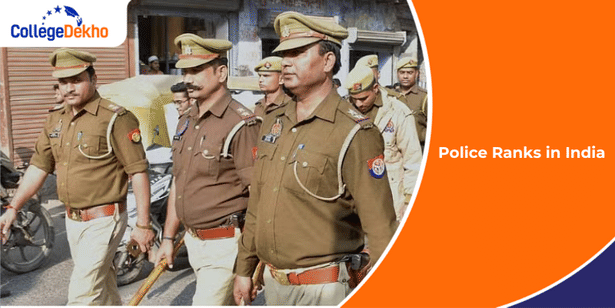The Police ranks in India go from Constable up to Director General of Police (DGP). Each rank comes with its own duties, from patrolling the streets to managing entire departments and keeping law and order in check.

Police Ranks in India
are decided on the basis of their recruitment and years of sevice in a partcular rank. Police ranks in India includes various positions and levels such as the constable, head constable, AI, SI, Inspector, DSP, ACP, SP, DCP, SSP, DGP etc. Police ranks and services in india mainly include the IPS, DANIPS, and SPS (State Police Services) . If you want to be one of the police rank holders in India, then you will have to crack the applicable government entrance exam like the
UPSC CSE
, UPSC CAPF, SSC CPO, SSC GD, etc.
The eligibility criteria for the police ranks in India varies from post to post and are specific for the state-level and national-level entrance exams. The police ranks are divided as per the laws of the government into four orders or levels in the police service commission. Based on thepolice ranks, every police personnel has a definite number of stars in their Insignia. The average salary for the post of police officers differs based on various factors stated by the state government, although it can go as high as Rs 17.5 Lakh annually. In this article, you can find the details regarding the police ranks in India, police post list with salary, level-wise responsibilities, and more.
Also Read:
How to Become a Police Officer?
Levels for Police Ranks in India
Indian Police recruits candidates at four different levels for its ranks. Each level has its own set of eligibility criteria, training requirements, and responsibilities within the force. The four major level of police posts are as follows:
- Constabulary
- Upper Sub-ordinate
- SPS (through the State Public Service Commission)
- IPS ( through Union Public Service Commission)
Complete Police Rank List in India & Their Responsibilities
To know the complete Police Rank List in India and details on their duties, reporting officers and level, read here:
Police Rank | Level | Resonsibilities | Reporting Panel |
|---|---|---|---|
Constable | Entry-Level | Patrolling, law enforcement, and addressing minor complaints. | Head Constable |
Head Constable | Entry-Level | Supervises constables, assists with investigations, and maintains records. | Assistant Sub-Inspector (ASI) |
Assistant Sub-Inspector (ASI) | Middle-Level | Investigate minor cases, record statements, and gather evidence. | Sub-Inspector (SI) |
Sub-Inspector (SI) | Middle-Level | Leads investigations and supervises police station staff and cases. | Inspector |
Inspector | Middle-Level | Commands police stations and oversees all operations and investigations. | Deputy Superintendent of Police |
Deputy Superintendent of Police (DSP)/Assistant Commissioner of Police (ACP) | Senior-Level | Supervises multiple stations, plans operations, and handles critical cases. | Superintendent of Police (SP) |
Superintendent of Police (SP)/Deputy Commissioner of Police (DCP) | Senior-Level | Manages district operations, resource allocation, and crisis management. | Senior Superintendent of Police |
Senior Superintendent of Police (SSP) | Senior-Level | Oversees large districts or urban police operations and manages high-level cases. | Deputy Inspector General (DIG) |
Deputy Inspector General (DIG) | Top-Level | Supervises police operations across multiple districts and coordinates major policies. | Inspector General (IG) |
Inspector General (IG) | Top-Level | Leads zones or ranges, formulates strategies, and manages high-priority cases. | Additional Director General (ADG) |
Additional Director General (ADG) | Top-Level | Handles statewide jurisdiction and oversees large-scale operations. | Director General of Police (DGP) |
Director General of Police (DGP) | Top-Level | Heads the state police force, responsible for overall policy and strategy. | State Government or Home Minister |
Indian Police Hierarchy Explained
The Indian Police Service ranks are structured in a hierarchy that mirrors the organisation of the police force in India. This hierarchy is designed to establish a clear chain of command and authority. The organisation of police ranks in India is as follows:
Constable Rank in Indian Police
The rank of constable is the starting position on the police rank list in India. In some states, constables are referred to as 'Sipahi.' Upon recruitment, they are permitted to carry rifles, with arms training provided thereafter. As they gain experience, a constable can advance to become a senior constable and then be promoted to the rank of head constable. This progression offers three main positions within the police force.
- Constable
- Senior Constable
- Head Constable
Assistant Sub Inspector Rank in the Indian Police Department
Assistant Sub-Inspectors are recruited through competitive examinations organised by individual state governments for various ranks within the Indian police force. Each state in India conducts its own recruitment process and exams for various ranks within the police force. There are three main positions available within this rank:
- Assistant Sub-Inspector of Police (ASI)
- Sub-Inspector of Police (SI)
- Inspector of Police (PI)
Provincial/State Police Service Officers (PPS/SPS) Ranks
The State Public Service Commission has a crucial role in recruiting state police service officers, officially recognised as a gazetted service. Those who have served in this position for a long time may be eligible for promotion to the Indian Police Service. After appointment as a Deputy Superintendent of Police (DSP) by their state Public Service Commission, individuals may be assigned to one of four main positions.
- Deputy Superintendent of Police (DSP)
- Additional Superintendent of Police (ASP)
- Superintendent of Police (SP)
- Senior Superintendent of Police (SSP)
Police Ranks in India: IPS
To join the Indian Police Service (IPS), you must first pass a specific civil service examination. Once you pass this exam, you will be eligible to be appointed as an assistant superintendent. Following your success in the civil services examination, you will have the opportunity to consider different roles within the police position list.
- Assistant Superintendent of Police
- Additional Superintendent of Police
- Superintendent of Police (SP)
- Senior Superintendent of Police (SSP)
- Deputy Inspector General of Police
- Inspector-General of Police (IGP)
- Additional Director General of Police
- Director-General of Police (DGP)
Order-wise Police Rank List in India with Insignia & Stars
The Indian government follows a specific hierarchy when it comes to recruiting police ranks. This hierarchy involves various ranks and badges, which signify the authority and responsibilities of the officers. Below is a table displaying the rank-wise Indian police position list and their corresponding badges and police star rank.
Ranking | Police Rank (Lowest to Highest) | Stars on Uniform | Badge | Recruitment Method |
|---|---|---|---|---|
15 | Constable | No Star |
| |
14 | Lance Naik/ Havaldar | No Star - Single Strip |
| Direct Recruitment through the Police Recruitment Board |
13 | Havaldar/ Senior Constable | No Star - Three Strips |
| Promotion |
12 | Head Constable/Assistant Sub-Inspector (ASI) | One Star, One Red Strip and One Blue Strip |
| Promotion/ Direct Recruitment through the Police Recruitment Board |
11 | Sub-Inspector (SI) | Two Star, One Red Strip and One Blue Strip |
| Promotion |
10 | Inspector | Three Star |
| Promotion |
9 | Deputy Superintendant of Police (Dy. SP) | Three Star, One Red Strip and One Blue Strip |
| PPS recruited through the SPSC/IPS in the initial years |
8 | Assistant Superintendent of Police (ASP) | Three Star & IPS Badge |
| IPS/PPS through promotion |
7 | Additional Superintendent of Police (ASP) | Ashok Emblem & IPS Badge |
| IPS/PPS through promotion |
6 | Superintendent of Police (SP) | Ashok Emblem, One Star & IPS Badge |
| IPS/PPS through promotion |
5 | Senior Superintendent of Police (SSP) | Ashok Emblem, Two Star & IPS Badge |
| IPS through promotion |
4 | Deputy Inspector General of Police (DIG) | Ashok Emblem, Three Star & IPS Badge |
| IPS through promotion |
3 | Inspector-General of Police (IG) | One Star, Cross Swords & IPS Badge |
| IPS through promotion |
2 | Additional Director General of Police (ADG) | Ashok Emblem, Cross Swords & IPS Badge |
| IPS through promotion |
1 | Director-General of Police (DGP) | Ashok Emblem, Cross Swords & IPS Badge |
| IPS through promotion |
Also Check: Police Post List with Salary Complete Guide
Police Post List with Salary (Updated as of 2025)
The table below contains the complete police position list, along with their respective annual salaries:Police Rank | Average Salary |
|---|---|
Inspector General of Police (IG) | INR 17.50 LPA |
Director General of Police (DGP) | INR 14.30 LPA |
Senior Superintendent of Police (SSP) | INR 13.50 LPA |
Superintendent of Police (SP) | INR 10.60 LPA |
Additional Superintendent of Police (ASP) | INR 9 LPA |
Deputy Superintendent of Police (DSP) | INR 7 LPA |
Inspector | INR 6.50 LPA |
Sub-inspector | INR 5.30 LPA |
Head Constable | INR 4.20 LPA |
Constable | INR 3-4 LPA |
Also Check: UP Police Rank List 2025
Police Rank in IG vs Commissionerate System of Policing
There are some differences in the Police department ranks in the Inspector General (IG) and the Commissionerate system of policing. While the lower ranks in both systems are the same, differences in ranks arise at the level above the inspector rank due to more powers in the Commissionerate system. Check the police hierarchy in the commissionerate system from the table given below.
Police Rank in IG Police System | Police Rank in Commissionerate Police System |
|---|---|
Director-General of Police (DGP) | |
Additional Director General of Police (ADG) | Commissioner of Police |
Inspector-General of Police (IGP) | Additional Commissioner of Police |
Deputy Inspector General of Police | Additional Commissioner of Police |
Senior Superintendent of Police | Deputy Commissioner of Police |
Superintendent of Police | Additional Deputy Commissioner of Police |
Additional Superintendent of Police | Additional Deputy Commissioner of Police |
Deputy Superintendant of Police (Dy. SP) | Assistant Commissioner of Police |
Inspector | |
Sub-Inspector | |
Assistant Sub-Inspector | |
Head Constable | |
Constable | |
The structure of police ranks in India is meticulously organised to ensure a clear hierarchy and chain of command within the law enforcement system. Understanding this hierarchy and the path of progression within the Indian police force not only clarifies the organisational structure of law enforcement in India but also highlights the opportunities and challenges faced by those serving to maintain law and order in the country.
Related Links:
Stay tuned with us for more articles and information related to the police post list and recruitment in India!
For more such content, stay tuned with CollegeDekho .
Are you feeling lost and unsure about what career path to take after completing 12th standard?
Say goodbye to confusion and hello to a bright future!

FAQs
In the police rank SP is a higher rank in the police ladder compared to the DSP rank.
Yes, the Assistant Sub-Inspector (ASI) rank in the Indian police service is indicated by a single star on their uniform, and is senior to Head Constables. The Superintendent of Police (SP) and Inspector-General of Police (IG) also have a single star on their uniform but are much senior than the Assistant Sub-Inspector (ASI) rank.
The police ranks in order of highest authority/seniority are as follows:
- Director-General of Police (DGP)
- Additional Director General of Police (ADG
- Inspector-General of Police (IG)
- Deputy Inspector General of Police (DIG)
- Senior Superintendent of Police (SSP)
- Superintendent of Police (SP)
- Additional Superintendent of Police (ASP)
- Assistant Superintendent of Police (ASP)
- Deputy Superintendant of Police (Dy. SP)
- Inspector
- Sub-Inspector (SI)
- Head Constable/Assistant Sub-Inspector (ASI)
- Havaldar/ Senior Constable
- Lance Naik/ Havaldar
- Constable
No, there is no 4-star police rank in India. The highest rank in the Indian Police Service (IPS) is Director General of Police (DGP), which is a 3-star rank. The DGP occasionally reports directly to the chief minister of the state and, in other cases, to the Chief Secretary of the state.
The Indian police ranks and salary have been mentioned below:
- Inspector General of Police (IG): INR 17.50 LPA
- Director General of Police (DGP): INR 14.30 LPA
- Senior Superintendent of Police (SSP): INR 13.50 LPA
- Superintendent of Police (SP): INR 10.60 LPA
- Additional Superintendent of Police (ASP): INR 9 LPA
- Deputy Superintendent of Police (DSP): INR 7 LPA
- Inspector: INR 6.50 LPA
- Sub-inspector: INR 5.30 LPA
- Head Constable: INR 4.20 LPA
- Constable: INR 3- 4 LPA
The police all post list include each and every police rank in India. As per the list, the lowest to highest police ranks in India are Constable, Lance Naik/ Havaldar, Havaldar/ Senior Constable, Head Constable/Assistant Sub-Inspector (ASI), Sub-Inspector (SI), Inspector, Deputy Superintendant of Police (Dy. SP), Assistant Superintendent of Police (ASP), Additional Superintendent of Police (ASP), Superintendent of Police (SP), Senior Superintendent of Police (SSP), Deputy Inspector General of Police (DIG), Inspector-General of Police (IG), Additional Director General of Police (ADG), and Director-General of Police (DGP).
No, the Central Government of India does not release a police promotion list. Promotion for every rank in the police rank list in India happens through a proper system and is done based on a candidate’s experience and time served in the Indian police force. Each rank on the police post list has its own set of eligibility criteria, training requirements, and responsibilities within the force.
The highest post in the police rank list is that of the Director-General of Police (DGP). The DGP occasionally reports directly to the chief minister of the state and, in other cases, to the Chief Secretary of the state. Other senior post in the police rank list include Additional Director General of Police (ADG), Inspector-General of Police (IG), Deputy Inspector General of Police (DIG), etc.
The state government of India defines the police post list in India by the legislatures and the rules. However, in the union territories, the Central government is responsible for controlling the police post list and salary through lieutenant governors of the union territories. The union government also has the power to establish any particular order regarding the police rank list in India if there is an emergency.
The Director General of Police (DGP) has the highest salary as per the other police ranks in India. The average salary of the DGP stands at INR 2,25,000 per month. The Additional Director General of Police (ADGP) makes INR 2,05,400 per month and the Inspector General of Police (IGP) makes INR 1,44,200 per month.
The Director General of Police (DGP) is higher in rank than an Inspector General of Police (IG) in the Indian police hierarchy. The DGP is typically the head of the police force of an entire state or union territory, while an IG is responsible for overseeing policing operations in a specific range of districts or zones within the state.
Was this article helpful?





















Similar Articles
KARTET Result 2025 (Soon): Direct Link, Qualifying Marks, Steps to Download KARTET scorecard, certificate
CTET Application Form Correction February 2026 (Starts): Direct Link, Instructions, Do's and Dont's
CBSE Class 10 Previous Year Question Papers 2024
SHRESHTA Class 9 Cutoff 2026: Check Opening and Closing Ranks
SHRESHTA Counselling 2026: Dates, Choice Filling, Seat Allotment, Admission Process
SHRESHTA Class 11 Science Cutoff 2026: Check Opening and Closing Ranks